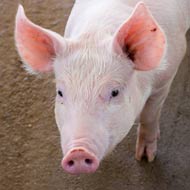Swine flu becoming 'harder to diagnose'

Laboratory tests are crucial for the precise identification of the viruses.
Diagnosis of swine flu from clinical signs has become increasingly difficult in recent years due to the change in the course of the disease. As a result, laboratory tests are crucial, delegates were told at a recent meeting in Germany.
Experts from the UK, Denmark, France, Spain, Poland, The Netherlands and Germany gathered at the meeting organised by IDT Biologika. They met to discuss swine flu in European pig populations.
It was accepted at the meeting that the disease cannot be easily diagnosed by the 'clinical eye' or clinical experience alone.
Infections occur throughout the year and multiple sub-types can be isolated on single farms. Laboratory tests, including the HI (haemagglutination inhibition) and PCR (polymerase chain reaction), are crucial for the precise identification of the viruses.
Infected sows may experience reduced reproductive performance, with a "high economic impact" for farmers, said Professor Markowska-Daniel from Poland.
IDT's Dr Silke Wacheck added: "Pigs play an important role in the epidemiology of influenza A viruses since they can act as a ‘mixing vessel’. Influenza viruses are prone to genetic variability and pigs are susceptible to pig, human and avian viruses."



 The Veterinary Medicines Directorate (VMD) is inviting applications from veterinary students to attend a one-week extramural studies (EMS) placement in July 2026.
The Veterinary Medicines Directorate (VMD) is inviting applications from veterinary students to attend a one-week extramural studies (EMS) placement in July 2026.